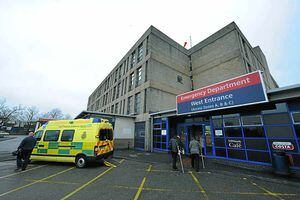Wolverhampton New Cross Hospital death rate whistleblower faces sack
A whistleblower who alleged she had been brought in to 'fix' mortality rates at a Black Country hospital has been told she 'behaved recklessly or negligently' in going public with her allegations and now faces being sacked.

Sandra Haynes Kirkbright claimed last year that she was 'head-hunted' by the Royal Wolverhampton NHS Trust, which runs Wolverhampton's New Cross Hospital, to cover up the true extent of the problem.
Mrs Haynes-Kirkbright claimed that 'every rule in the book' was broken to try to improve mortality rates, and alleged that she was suspended from her post as a senior health coder after refusing to take part in a cover-up.
The trust rejected the allegations of altering the death rates, calling them an 'outrageous slur', and said independently-verified evidence 'categorically disproved' her claims. The hospital's chief executive, David Loughton, said at the time: "Improvements in the hospital's mortality rates have been audited and independently verified."
Mrs Haynes-Kirkbright was suspended by the trust after allegations of bullying, harassment, persistent swearing and unprofessional behaviour were made against her by colleagues through their union in 2012.
She has now been ordered to attend a disciplinary hearing. In the letter sent by email, hospital managers claimed she had 'behaved recklessly or negligently in disclosing information regarding the Trust to an external source without the Trust's authorisation to do so', and accused her of breaching employment contracts by speaking to the press. She was warned: "This may result in formal disciplinary action, not excluding dismissal." The threat raises further questions about protection for whistleblowers following the Mid Staffordshire scandal.
Mrs Haynes-Kirkbright ,a health coder, previously said she recorded details of the care received by patients and claimed conditions at Wolverhampton were as bad or worse as those at the Stafford trust.
She believed that the hospital wanted to 'fix' its death rates rather than improve patient care, and claimed coders were recording too many deaths at the hospital under 'palliative care', which as they were classed as 'unavoidable' would not alter the hospital's mortality rate.
Responding at the time, Mr Loughton said they categorically denied all the allegations and that any suggestion of any wrong-doing were simply not true.





